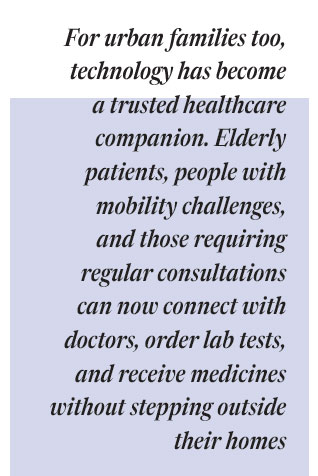
SUMAN SAHA
A quiet digital revolution is redefining Bangladesh’s healthcare landscape. From teleconsultations and AI-powered diagnostics to app-based health management, digital solutions are expanding access, reducing costs, and delivering medical care right to people’s doorsteps – even in the most remote corners of the country.
Innovation is also advancing rapidly. Robots are now stepping into the healthcare arena to provide specialised treatments. Bangladesh Medical University in Dhaka has recently opened the country’s first state-of-the-art robotic rehabilitation centre, where AI-powered robots deliver physiotherapy and other specialised services. Established with support from China, the facility marks a new era of tech-enabled patient care.
For urban families too, technology has become a trusted healthcare companion. Elderly patients, people with mobility challenges, and those requiring regular consultations can now connect with doctors, order lab tests, and receive medicines without stepping outside their homes. 
Digital platforms simplify appointment scheduling, enable secure video consultations, and provide easy access to medical records -- all with a few taps on a smartphone.
For thousands of patients, these platforms have become lifelines, especially during illness or emergencies. Such examples highlight a broader shift in Bangladesh’s healthcare landscape, where digital tools are bridging critical service gaps.
For Ajita Rani Sarker, 64, in Dhaka, technology became a lifeline when she was bedridden with severe flu. Her son booked a telemedicine appointment, allowing her to consult a specialist without leaving home.
“I could barely move, but through the app I got tests done and spoke to a doctor. It was a huge help in a tough time,” she told the Daily Sun.
Stories like these signal a profound transformation in Bangladesh’s healthcare landscape. The COVID-19 pandemic exposed long-standing weaknesses – shortages of doctors, poor infrastructure, and weak coordination – but it also accelerated the adoption of telemedicine, AI diagnostics, and mobile health apps. These innovations are now reshaping how care is delivered and accessed.
Bangladesh’s digital healthcare market is valued at $605 million in 2025 and projected to hit $849 million by 2029, growing at 8.8% annually. The largest segment, digital fitness and well-being, is expected to expand from $360 million to $504 million, while digital care management will reach $109 million by 2029, according to industry insiders.
Innovators driving change
From start-ups to established players, innovators are pushing boundaries nationwide.
Praava Health blends telemedicine with physical clinics. Arogga fights counterfeit medicines. Maya offers anonymous health advice in Bangla language. CMED Health uses AI to monitor patients. LifePlus Bangladesh has created a one-stop health hub, offering home diagnostics, medicine delivery, and ambulance bookings via smartphone. Shukhee, by Grameen Digital Healthcare Solutions, delivers end-to-end healthcare, including teleconsultations, home lab tests, and nationwide medicine delivery for individuals and businesses.
Specialised services are flourishing too.
DocTime provides secure video consultations with integrated payments. DoctorKoi’s smart prescription software, used by over 1,300 doctors, has generated millions of prescriptions. Zaynax Health serves thousands, including garment workers, while AmarLab brings laboratory tests directly to patients’ doorsteps.
Milvik Bangladesh, a pioneer in tele-doctor services, offers micro health, life, and travel insurance, making healthcare and protection affordable for millions.
Pandemic as a turning point
“COVID-19 exposed deep cracks in Bangladesh’s healthcare system, but it also ignited a digital health revolution. Patients are more empowered and comfortable managing their health digitally,” said Sylvana Quader Sinha, founder and CEO of Praava Health.
With a median age of 27 and near-universal mobile access, Bangladesh is well-positioned for digital adoption. The success of mobile financial services has reduced fears over online payments, while the pandemic normalised remote consultations.
“We see the biggest opportunity in bringing healthcare directly into people’s hands,” said Sharif MD Abid, CEO of LifePlus Bangladesh. “Convenience matters, but trust and affordability will decide success.”
He added that more people are turning to app-based digital healthcare, drawn by ease of use and competitive rates.
Barriers to growth
Still, challenges remain. Only 15% of rural health workers are digitally literate. Bangladesh has just 7 doctors per 10,000 people – far below the WHO’s recommended 22.8. Over 70% of digital health projects depend on donor funding, and with health insurance covering less than 1% of the population, affordability is a major concern.
Cultural habits also slow adoption. Many prefer face-to-face visits, especially older patients. Privacy concerns, particularly around women’s health, and scepticism towards telecom-based medical advice persist, said Sharif of LifePlus Bangladesh Ltd, a sister concern of Labaid Group.
Experts stress that building trust requires partnerships with local hospitals, delivering services in Bengali and regional dialects, offering family-oriented solutions, and focusing on wellness.
They also point to the need for robust data protection, including transparent policies, local data storage, user control over personal information, encryption, secure servers, and clear breach protocols, alongside collaboration with medical associations and regular audits.
Technology and community
Dr Ahmed Ehsanur Rahman, scientist in the maternal and child health division at icddr,b, said technology’s benefits hinge on community readiness.
“The true impact of technology is realised only when communities are empowered to use it effectively. We must leverage digital tools to tackle persistent health challenges while ensuring that unchecked digitalisation does not deepen inequities,” said Ahmed, who is also a member of the health sector reform commission, Government of Bangladesh.
________________________________
Suman Saha is Business and Economic Affairs Editor at the Daily Sun.
Email: [email protected]

